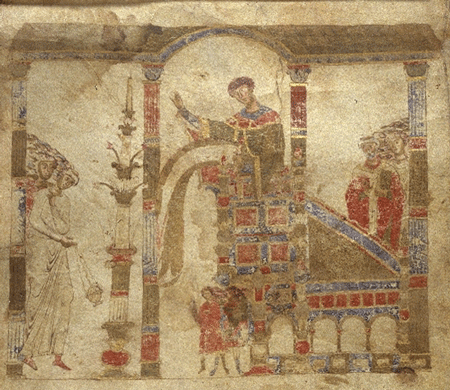15 – 26 July 2024, weekdays
IL: L719
KULeuven: B-KUL-A07E1A 4 study points
 Taught by: Duco Vollebregt
Taught by: Duco Vollebregt
The Easter proclamation is known by its first word in Latin: Exultet. It is sung at the beginning of the Easter vigil in candlelight. An Exultet scroll has the words and musical notation for the deacon to sing, and, as the scroll gradually cascades down the front of the ambo, it reveals images for the people to see which illustrate the text being sung.
This course will be conducted on several tracks.
1) Daily instruction will be given by Duco Vollebregt from 9:45-11:45 AM with a break. You may attend his lectures for appreciation (no exam, no credit).
2) You may also begin to make your own Exultet scroll either on your own or with the moderation of our icon studio (description here).
3) Enrol for credit with KU Leuven and either create an Exultet scroll with a written description or write a 15-20 page research paper.
At the end of the course each student will be prepared:
- To describe and interpret the textual imagery in the Exultet.
- To describe and interpret the ritual of proclaiming Exultet.
- To come to a greater appreciation of the integration of all elements of the rite.
- Academics will be guided in writing a paper by an expert in the field.
- Artists will apply their understanding by beginning to make their own scroll.
- Historians will appreciate the process of developing such a rich liturgical rite.
- Liturgists will study sources and ways of interpreting this liturgical rite.
Hours: 9.45 – 12.45 (including a break)
The course anticipates the student will spend 60 hours in personal reading and study.
Cost: £300
Location: Liturgy Institute (at Ealing Abbey)
74 Castlebar Road Ealing London, W5 2DD, UK
Telephone: +44 (0)20 8194 2320
For further details or to register contact the Institute:
E-mail Clare Cogswell, the Registrar, at this linked E-mail address.
Location on Google Maps is found here.
KU Leuven awards 4 study points upon the successful completion of this graduate course.
Those not registered for credit at KU Leuven may take this course to fulfill one of the requirements for the Institutum Liturgicum certificate.
Others may attend for interest without other obligations.
 Previous knowledge
Previous knowledge
It is recommended that participants have a general familiarity with the Bible and the history of western civilization in the Christian period in order to understand the general context of the documents examined. A basic ability to compose a written work is necessary before developing the specifics of academic writing. Transcription of a Latin text suggests some awareness of the Latin text of the Exultet.
Content
This course is intended for students of liturgy and for students of iconography. Classroom instruction will address the history and composition of the rite as a whole and of the Exultet in particular. We shall explore the imagery presented in the text and its reflection in the art of a scroll. We shall interpret the ritual proclamation of the Exultet. Studio time will allow a practical exploration in creating an Exultet scroll and the opportunity to begin to creating one’s own scroll.
Course Material
♦ Vollebregt, D., Hac nocte in aeternum diem renascentes populi procreantur: Christian initiation and the Easter vigil in the Missale Gothicum (Spicilegium sacrum Lovaniense. Études et documents 58. Studia breviora 3), Peeters, Leuven 2021.
♦ Vollebregt, D., “Night or Dawn? Easter night in the light of cosmos and creation”, in Full of Your Glory: Liturgy, cosmos, creation, ed. T. Berger, Liturgical Press, Colegeville (Minnesota) 2019, 117-136.
♦ The Illuminated Easter Proclamation, illustrated by C. Rohrbacher, Liturgical Press, Collegeville (Minnesota) 2012.
♦ Kelly, T.F., The Exultet in Southern Italy, Oxford UP, New York – Oxford 1996.
♦ Students are greatly helped by their own electronic or online access to databases of primary texts such as: BibleWorks.
♦ Students enrolled at KU Leuven will have access to the Library of Latin Texts, Brepols.
Description of learning activities
♦ develop a reasoned understanding of textual images in this prayer
♦ identify the different elements of a rite: ritual, text, symbols, art, architecture
♦ interpret the contribution of each element of the rite according to its own mode of expression
♦ use library resources and source texts in original languages to study liturgical texts
♦ use online resources for the scientific study of liturgy
♦ participate in class lectures and discussions.
Evaluation description
Examination type: written: 50% either an academic paper or a scroll with written description and discussion in person: 50%
When: evaluation outside normal examination period.
Either: Two printed copies of an academic paper,
OR: Initial work on an Exultet scroll,
is to be delivered to the Registrar by 30 August 2024.
Explanation: The student and instructor agree on a pathway of study.
Auditors may work on their own scroll, but they do not take an exam and receive no credit.
IL Award Students complete the examination and receive a mark not for credit.
Credit seeking students enrol, complete either an academic research paper or begin work on an Exultet scroll with a written description; either is due by 30 August 2024.
Credit seeking students either write an academic paper on an approved aspect of the Exultet or begin work on creating an Exultet scroll with a written description. They illustrate their ability to incorporate primary sources (heuristics) and methods to interpret the Exultet and its scroll (hermeneutics). During the in person discussion, the instructor may ask the student to explain the method used in discovering sources, interpreting the prayer and writing a reasoned argument. The instructor asks questions that help the student come to a more satisfactory explanation of the prayer.
Criteria for evaluation: The student demonstrates a facility with the methods presented in class 1) to discover the context and sources underlying the prayer and 2) to interpret the prayer and either 3A) to present a coherent argument about the prayer based on their research or 3B) to present a coherent description of one’s own initial work creating an Exultet scroll. The essay is not intended to be a comprehensive study of the prayer, but a demonstration of finding sources (heuristics), interpreting the rite (hermeneutics) and developing an argument (synthetics). The discussion questions are both theoretical, concerning the student’s understanding of the methods presented in class, and applied, concerning the student’s ability to apply these methods to the interpretation of the prayer text and scroll.
Second opportunity to sit the exam: Because this is an intensive summer course, the opportunity for a second exam is by appointment and depends upon the availability of the instructor.
Note: Students must be over 18 years of age.
This is a research seminar. Because of the demands of original research during an intensive summer programme, participants may prepare for the intensive schedule by reading suggested texts before the course begins and are recommended to allow considerable time in their schedule for research and/or studio time during the two weeks of the seminar and in the weeks following.
Students and the public are invited to attend the annual St Bede Lecture, to be held at Ealing Abbey on Sunday afternoon 7 July at 3:00 PM in the Ealing Abbey Parish Hall.
Accommodation:
Non residential day students are welcome.
Limited accommodation is available through Ealing Abbey house for guests or other religious houses or nearby.
E-mail Clare Cogswell, the Registrar, at this linked E-mail address.
Additional information from KU Leuven course web-site
Academic year: 2024−2025
Study points: 4
Language: English
Difficulty: Master’s level-Introductory
Duration: 26.0 hours
Periodicity: Taught annually
POC: POC Theology and Religious Studies
This course is included in
Research Master of Advanced Studies in Theology and Religion (120 ECTS)
Master of Theology and Religious Studies Study Abroad Programme in European Culture and Society (PECS).
A link to the course descriptor at KU Leuven is not yet available, but the course is based on one previously offered (link here).
Page created on 27 July 2024 by DM.